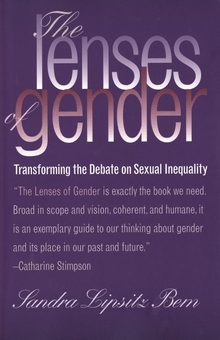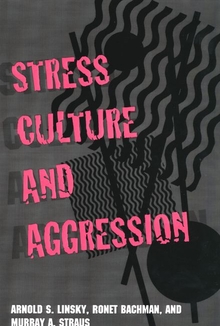The Lenses of Gender
WARNING
You are viewing an older version of the Yalebooks website. Please visit out new website with more updated information and a better user experience: https://www.yalebooks.com
Transforming the Debate on Sexual Inequality
Sandra Lipsitz Bem
According to Bem, the first lens, androcentrism (male-centeredness), defines males and male experience as a standard or norm and females and female experience as a deviation from that norm. The second lens, gender polarization, superimposes male-female differences on virtually every aspect of human experience, from modes of dress and social roles to ways of expressing emotion and sexual desire. The third lens, biological essentialism, rationalizes and legitimizes the other two lenses by treating them as the inevitable consequences of the intrinsic biological natures of women and men.
After illustrating the pervasiveness of these three lenses in both historical and contemporary discourses of Western culture, Bem presents her own theory of how the individual either acquires cultural gender lenses and constructs a conventional gender identity or resists cultural lenses and constructs a gender-subversive identity. She contends that we must reframe the debate on sexual inequality so that it focuses not on the differences between men and women but on how male-centered discourses and institutions transform male-female difference into female disadvantage.
"Sandra Bem, one of the nation's leading authorities on gender roles, has brought new insights to bear on longstanding questions. This powerful treatment of sex-based differences will redefine debates of enormous theoretical significance and societal importance."—Deborah L. Rhode, professor of law at Stanford Law School, editor of Theoretical Perspectives on Sexual Difference, and author of Justice and Gender
"Written by a groundbreaking theorist in the psychology of women and gender studies, this book adds fuel to the controversies that swirl around the topics of gender similarities and differences, and it integrates an analysis of both homophobia and heterosexism in its theory of how male power is reproduced."—Mary Roth Walsh, professor of psychology at the University of Massachusetts, Lowell, and editor of The Psychology of Women: Ongoing Debates
"A stimulating and tightly argued treatise on how American and Western culture defines gender. . . . Offers suggestions for revaluing the male 'standard,' for increasing social support of the bearing and raising of children, and for dismantling gender polarization. A thought-provoking study, bringing together many social, biological, and political theories into a well-reasoned volume."—Kirkus Reviews
"Bem theorizes answers to some of the most essential questions in the debate on gender inequality. . . . For any library with a women's studies collection."—Choice
"This book provides a thought-provoking, accessible examination of sexual inequality that should prove useful to feminist scholars as well as to those who are less familiar with feminist scholarship."—Leanne Lamke, Journal of Marriage and the Family
"[Bem] shows how the cultural debate about male-female differences has captured the public imagination to the detriment of efforts to increase sexual equality. At a time when the aims of the contemporary women's movement are not always apparent or agreed upon, Bem arguably offers the best new vision."—Joanie MacArthur, Bloomsbury Review
"This book succeeds at its goals of recasting social debate on inequality. . . . As an accessibly written, intelligent book that raises important political issues, it is well worth reading for all of us, and great for students."—Cecilia L. Ridgeway, Contemporary Sociology
"A new framework, or at least a new vocabulary, for understanding the oppression of women and sexual minorities."—Jill M. Dahlmann, Michigan Law Review
"The Lenses of Gender is exactly the book we need. Broad in scope and vision, coherent, and humane, it is an exemplary guide to our thinking about gender and its place in our past and future."—Catharine Stimpson, University Professor at Rutgers University and author of Where the Meanings Are
Publication Date: August 31, 1994









